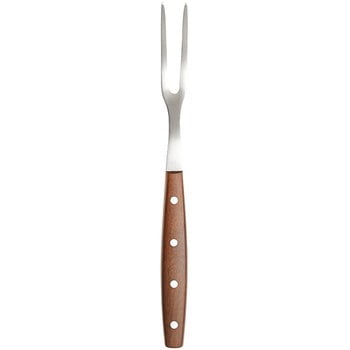The Norr knife collection, designed by Jacob Leth-Espensen for Fiskars, combines high quality materials with pleasant, ergonomic design, inspired by traditional Nordic kitchen and culture. The wooden handles are crafted of environmentally friendly FSC certified maple: the innovative Kebony technology gives it a rich brown color and makes it tougher than teak. The Norr blades are made of German steel with a hardness of HRC 54.
Norr steak fork
Fiskars
Description
The Norr knife collection, designed by Jacob Leth-Espensen for Fiskars, combines high quality materials with pleasant, ergonomic design, inspired by traditional Nordic kitchen and culture. The wooden handles are crafted of environmentally friendly FSC certified maple: the innovative Kebony technology gives it a rich brown color and makes it tougher than teak. The Norr blades are made of German steel with a hardness of HRC 54.
Product details (2)
- Material
- Stainless steel, Kebony treated maple
- Length
- 9.45 in (24 cm)
- Product ID
Designer
Jacob Leth-Espensen is a Danish designer who has studied industrial design at the Aarhus School of Architecture. Before founding his own studio in 2007, Leth-Espensen worked for the companies Designit and Friis & Moltke. His best known designs include cutlery for the Finnish brand Fiskars – Leth-Espensen's Royal knife set for Fiskars was awarded with the iF Design Award 2011.
View all productsReviews (0)
Sustainability
The Product Sustainability Framework, our criteria of sustainable design, helps you find the most sustainable products in our selection. Read below which sustainability criteria this product has met.
Working conditions & labour 8/9
-
Equal opportunities for all employees
-
Commitment to UN Global Compact, fair compensation for all employees
-
Corporate responsibility requirements defined and communicated for suppliers
-
Systematic work for improved inclusion and well-being in the workplace
-
Transparent supply chain
-
Suppliers' compliance to a code of conduct ensured
-
Compliance to the UN Guiding Principles on Business and Human Rights ensured in the supply chain
-
Support for community involvement in the supply chain
-
Direct suppliers audited and certified
Eco-friendly production 7/9
-
Fair and resource-wise water-use in production
-
No incineration or landfilling of returned items
-
No use of endangered species as materials
-
No direct environmental emissions or waste (excl. GHGs) from production
-
The sustainability of direct suppliers' production is addressed and monitored
-
Material-efficient and ecological packaging
-
Positive impact on nature’s well-being through operations that regenerate natural ecosystems
-
Production and material sourcing that respect biodiversity, animal rights, and natural ecosystems
-
No potentially harmful chemicals used in own production
Climate impact 5/8
-
Company's direct greenhouse gas emissions identified and commitment to reduction
-
Product's carbon impact identified and commitment to reduction
-
Guidance on energy- and eco-efficient use of the product
-
Contribution to climate initiatives beyond the brand’s direct operations
-
Low-carbon or compensated transportation
-
Carbon footprint of the product calculated and goals set to reduce it
-
100 % renewable energy in own production and operations
-
Carbon neutral or carbon negative product
Sustainable materials 5/6
-
Sustainable and long-lasting material choices
-
No harmful or hazardous substances
-
Responsible raw material sourcing and production
-
Materials suited for circularity: monomaterials, recyclable finishings, renewable or recycled contents etc.
-
Ecological materials: natural, biodegradable, recyclable or recycled contents
-
Outstanding materials in terms of innovativeness, responsibility, sustainability and circularity: local production or sourcing, 100 % recycled content, C2C-certification etc.
Circular design 4/5
-
High aesthetic quality promoting long-term use of the product
-
Technically durable product design and material choices
-
Design for enduring life-long quality
-
Design and support for product maintenance, repair and upgradability
-
Innovative circular design solutions: circular service system, resale platform, remanufacturing, collection of used products, etc.




